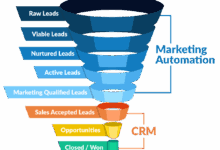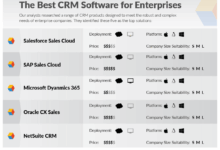Top Cloud-Based CRM Platforms
Top Cloud-Based CRM Platforms are revolutionizing how businesses manage customer relationships. This shift towards cloud-based solutions offers unparalleled flexibility, scalability, and cost-effectiveness compared to traditional on-premise systems. We’ll explore the leading platforms, their key features, and how they can empower your business to achieve greater efficiency and success in managing customer interactions.
From small startups to large enterprises, the right CRM platform can streamline operations, improve sales processes, and foster stronger customer relationships. This exploration delves into the diverse landscape of cloud-based CRM options, examining their strengths, weaknesses, and suitability for various business needs. Understanding the nuances of different deployment models (public, private, hybrid) and pricing structures is crucial for making an informed decision.
Introduction to Cloud-Based CRM Platforms
Cloud-based CRM (Customer Relationship Management) platforms represent a significant shift in how businesses manage their interactions with customers. They offer a flexible and scalable alternative to traditional on-premise systems, leveraging the power of the internet to store and access customer data. This approach offers numerous benefits, impacting efficiency, cost, and accessibility for organizations of all sizes.
Cloud-based CRM systems store and manage customer data on remote servers maintained by a third-party provider, rather than on the company’s own hardware and software. This eliminates the need for extensive IT infrastructure and allows access to the CRM system from anywhere with an internet connection.
Advantages of Cloud-Based CRM over On-Premise Solutions
The transition to cloud-based CRM offers compelling advantages. Reduced upfront costs are a major benefit, eliminating the need for significant investment in servers, software licenses, and IT personnel for maintenance and support. Scalability is another key advantage; cloud-based systems can easily adapt to changing business needs, allowing businesses to quickly scale up or down their resources as required. This flexibility is particularly beneficial for rapidly growing companies or those experiencing seasonal fluctuations in demand. Enhanced accessibility is also a significant benefit, providing employees with access to customer data from any location with an internet connection, promoting collaboration and improving response times. Finally, automatic updates and maintenance managed by the provider minimize the need for internal IT resources, freeing up valuable time and resources for other business-critical activities.
Types of Cloud-Based CRM Deployments
Cloud-based CRM systems are deployed in various models, each catering to different business needs and security requirements. The three primary deployment models are public, private, and hybrid clouds. Understanding the differences between these models is crucial for selecting the optimal solution.
Comparison of Cloud-Based CRM Deployment Models
| Feature | Public Cloud | Private Cloud | Hybrid Cloud |
|---|---|---|---|
| Cost | Typically lower upfront costs, pay-as-you-go model | Higher upfront costs, but potentially lower long-term costs with high usage | Moderate costs, balancing the benefits of both public and private clouds |
| Security | Shared responsibility model, relies on provider’s security measures | Greater control over security, dedicated infrastructure | Enhanced security through a combination of public and private cloud features |
| Scalability | Highly scalable, easily adjust resources as needed | Scalable, but requires more planning and management | Offers scalability through both public and private cloud components |
| Control | Limited control over infrastructure | Greater control over infrastructure and data | Balanced control, depending on the allocation of resources between public and private clouds |
Top Platforms
The cloud-based CRM market is incredibly diverse, offering solutions tailored to businesses of all sizes and industries. Choosing the right platform requires careful consideration of factors like budget, features, and integration capabilities. This section provides an overview of some leading cloud-based CRM platforms, categorized by their typical user base and highlighting their key strengths.
Top Cloud-Based CRM Platforms: Market Overview
The following list presents a selection of prominent cloud-based CRM platforms. It’s important to note that the “best” platform depends heavily on individual business needs and priorities. This overview aims to provide a starting point for further research.
- Salesforce Sales Cloud: A comprehensive, highly scalable platform ideal for large enterprises and complex sales processes. Its unique selling points include robust automation capabilities, advanced analytics, and extensive customization options. It’s known for its strong ecosystem of third-party integrations. Salesforce’s strength lies in its ability to handle intricate sales cycles and large volumes of data. It excels in enterprise-level solutions and complex sales processes.
- Microsoft Dynamics 365: A powerful CRM solution tightly integrated with the Microsoft ecosystem. This makes it a particularly attractive option for businesses already heavily invested in Microsoft products. Its strengths include seamless data integration with other Microsoft applications and a user-friendly interface for those familiar with the Microsoft environment. Dynamics 365 caters to a wide range of businesses, from small to enterprise-level.
- HubSpot CRM: A popular choice for small and medium-sized businesses (SMBs), HubSpot offers a freemium model with a generous free plan. Its ease of use and robust marketing automation features make it a strong contender for businesses focusing on inbound marketing and sales. HubSpot’s focus is on ease of use and marketing integration.
- Zoho CRM: A highly customizable and affordable CRM option suitable for various business sizes. Zoho offers a wide array of features at competitive price points, making it a versatile solution for businesses seeking a balance between functionality and cost. Zoho is known for its extensive feature set and competitive pricing.
- SAP CRM: Primarily aimed at large enterprises, SAP CRM is a robust platform designed to manage complex business processes across diverse departments. Its strength lies in its enterprise resource planning (ERP) integration and ability to handle vast amounts of data across multiple business units. SAP CRM is best suited for large organizations with complex operational requirements.
- Oracle Siebel CRM: A legacy CRM system with a strong presence in specific industries (e.g., financial services). While it may not be as trendy as newer platforms, it retains a loyal customer base due to its robust functionality and proven track record in managing complex sales cycles within established industries. Siebel’s strength lies in its longevity and industry-specific features.
Pricing Models Comparison
Pricing for cloud-based CRM platforms varies greatly depending on the chosen features, number of users, and the specific vendor’s pricing structure. The following table offers a generalized comparison; exact pricing should be verified directly with each vendor.
| Platform | Pricing Model | Typical Starting Price (USD/month) | Notes |
|---|---|---|---|
| Salesforce Sales Cloud | Subscription based, per user | $25+ | Pricing varies significantly based on features and user count. |
| Microsoft Dynamics 365 | Subscription based, per user | $65+ | Pricing depends on chosen modules and user count. |
| HubSpot CRM | Freemium, subscription based | $0 – $450+ | Offers a free plan with limited features. |
| Zoho CRM | Subscription based, per user | $14+ | Multiple plans available with varying features. |
| SAP CRM | Subscription based, per user | Contact Sales | Pricing is highly customized and requires direct engagement with the vendor. |
| Oracle Siebel CRM | Subscription based, per user | Contact Sales | Pricing is highly customized and requires direct engagement with the vendor. |
Feature Comparison
Choosing the right cloud-based CRM platform depends heavily on understanding the core functionalities and how well they align with your business needs. This section compares leading platforms across key areas, highlighting strengths and weaknesses to aid in your decision-making process. We will examine contact management, sales automation, marketing automation, user interface, ease of use, and integration capabilities.
Contact Management Capabilities
Effective contact management is fundamental to any CRM. Leading platforms offer robust features for organizing and interacting with customer data. For example, Salesforce boasts a highly customizable contact management system allowing for detailed record-keeping and segmentation. HubSpot, on the other hand, integrates contact management seamlessly with its marketing tools, enabling efficient lead nurturing. Zoho CRM provides a more affordable option with a comprehensive set of contact management features, although its interface might feel less intuitive to some users compared to Salesforce. The level of customization and the sophistication of features like contact scoring and segmentation will vary significantly across platforms.
Sales Automation Features
Sales automation streamlines repetitive tasks, freeing up sales teams to focus on closing deals. Salesforce’s Sales Cloud offers a wide array of automation tools, including lead assignment, opportunity management, and sales forecasting. HubSpot’s sales features are deeply integrated with its marketing tools, facilitating a smoother sales and marketing alignment. Zoho CRM offers a more basic level of sales automation, but it’s sufficient for many smaller businesses. The extent of automation, including features like automated email sequences and lead scoring, differentiates these platforms.
Marketing Automation Functionality
Marketing automation is crucial for nurturing leads and driving conversions. HubSpot is often considered the leader in this area, providing a comprehensive suite of tools for email marketing, social media management, and campaign tracking. Salesforce Marketing Cloud offers powerful features but may require a steeper learning curve and a larger investment. Zoho CRM also offers marketing automation features, but they are less extensive than those of HubSpot or Salesforce. The scale and sophistication of features, such as A/B testing and lead scoring, vary considerably.
User Interface and Ease of Use
The user interface (UI) and overall ease of use are critical factors influencing user adoption and productivity. Salesforce, while powerful, can have a steep learning curve, particularly for users unfamiliar with CRM systems. HubSpot generally receives positive feedback for its intuitive interface and ease of navigation. Zoho CRM sits somewhere in the middle; while functional, it may not be as visually appealing or user-friendly as HubSpot. Consider factors like customization options, reporting dashboards, and mobile accessibility when evaluating UI and ease of use.
Integration Capabilities
Seamless integration with other business tools is essential for maximizing efficiency. All three platforms offer APIs and integrations with various third-party applications. Salesforce boasts a vast AppExchange marketplace with numerous pre-built integrations. HubSpot also offers a strong integration ecosystem. Zoho CRM provides a solid set of integrations, although its ecosystem might be smaller than Salesforce’s or HubSpot’s. The breadth and depth of integrations, including accounting software, email marketing platforms, and other business tools, are important considerations.
Feature Comparison Table
| Feature | Salesforce | HubSpot | Zoho CRM |
|---|---|---|---|
| Contact Management | Highly customizable, robust features | Seamless integration with marketing tools | Comprehensive, affordable |
| Sales Automation | Extensive automation tools, advanced features | Integrated with marketing, streamlined workflow | Basic automation, suitable for smaller businesses |
| Marketing Automation | Powerful features, but complex | Industry-leading, comprehensive tools | Less extensive than Salesforce or HubSpot |
| User Interface | Powerful but can have a steep learning curve | Intuitive and user-friendly | Functional, but may not be as visually appealing |
| Integrations | Vast AppExchange marketplace | Strong integration ecosystem | Solid integrations, but smaller ecosystem |
Scalability and Customization
Choosing a cloud-based CRM involves careful consideration of scalability and customization options to ensure the platform grows with your business and adapts to your specific workflows. The ability to seamlessly scale resources and tailor the system to your unique needs is crucial for long-term success and efficiency. This section examines how leading CRM platforms address these critical aspects.
Scalability and customization are intertwined; a highly scalable platform usually offers more extensive customization options. A platform’s scalability is measured by its ability to handle increasing user numbers, data volume, and transaction loads without performance degradation. Customization, on the other hand, refers to the platform’s flexibility in adapting to a company’s specific business processes, data structures, and reporting requirements. Security and compliance are paramount, ensuring data protection and adherence to relevant regulations.
Scalability Options
The scalability of a cloud-based CRM is typically determined by its ability to adjust resources on demand. This includes factors like user licenses, data storage capacity, and processing power. Most platforms offer various pricing tiers to accommodate different business sizes and needs. For instance, Salesforce offers a range of editions, from Essentials for small businesses to Enterprise Edition for larger organizations with more complex requirements. Similarly, Microsoft Dynamics 365 provides various plans catering to different scales of operation. Zoho CRM also provides tiered pricing plans that scale with the needs of the user. These plans typically include different numbers of users, storage space, and access to advanced features. Understanding these scaling options is critical for budgeting and long-term planning.
Customization Options
Customization capabilities allow businesses to tailor the CRM to their unique operational needs. This often involves API access for integration with other business systems, allowing for seamless data flow and automation. Many platforms support third-party integrations, extending their functionality through pre-built connectors or custom development. For example, Salesforce’s AppExchange offers a vast library of pre-built integrations, enabling quick and easy connections to various tools like marketing automation platforms, e-commerce systems, and accounting software. Similarly, Microsoft Dynamics 365 offers its AppSource marketplace with a wide array of integrations. Zoho CRM also boasts a strong marketplace of extensions and integrations to enhance functionality. The extent of customization often depends on the platform’s API capabilities and the level of developer support provided.
Data Security and Compliance
Data security and compliance are paramount in choosing a cloud-based CRM. Reputable platforms employ robust security measures, including data encryption, access controls, and regular security audits. Compliance with industry standards like GDPR, HIPAA, and CCPA is also critical. Salesforce, for example, invests heavily in security infrastructure and regularly undergoes independent security audits to maintain compliance with various regulations. Microsoft Dynamics 365 similarly prioritizes data security and offers a range of compliance certifications. Zoho CRM also implements stringent security measures and works to maintain compliance with relevant data protection regulations. Businesses should carefully review a platform’s security policies and certifications before choosing a provider.
Examples of Business Customization
Businesses can customize CRM platforms in various ways to meet their specific needs.
- Workflow Automation: Automating repetitive tasks such as lead assignment, follow-up emails, and reporting can significantly improve efficiency. A manufacturing company could automate the process of assigning leads to sales representatives based on geographic location and product specialization.
- Custom Fields and Objects: Adding custom fields to store specific data relevant to the business, such as product serial numbers or customer feedback scores, allows for more comprehensive data management. A retail business could add custom fields to track customer preferences and purchase history.
- Integrations with Other Systems: Integrating the CRM with accounting software, marketing automation platforms, or e-commerce systems creates a unified view of customer data and streamlines operations. An e-commerce business could integrate its CRM with its online store to automatically update customer information and track purchases.
- Custom Reporting and Dashboards: Creating custom reports and dashboards provides valuable insights into business performance and allows for data-driven decision-making. A financial services company could create custom dashboards to track key performance indicators (KPIs) such as sales conversion rates and customer retention.
Customer Support and Training
Choosing the right cloud-based CRM platform involves careful consideration of the support and training resources offered. Effective onboarding and ongoing assistance are crucial for maximizing platform utilization and ensuring a smooth user experience. Different platforms offer varying levels of support, impacting user satisfaction and overall productivity.
The availability and quality of customer support directly influence a company’s ability to adopt and effectively utilize a CRM system. Comprehensive training materials and responsive support channels minimize disruption and accelerate the learning curve for new users. Furthermore, access to a thriving community can provide invaluable peer-to-peer support and insights.
Customer Support Resources
Each platform employs a unique approach to customer support. Documentation quality, accessibility of online help, and the availability of phone support vary significantly. Some platforms prioritize self-service options like extensive knowledge bases and video tutorials, while others offer more direct interaction through phone or email support. The comprehensiveness and clarity of the documentation are key factors to consider.
Training and Onboarding Options
Effective onboarding is critical for successful CRM implementation. Platforms offer various training options, ranging from self-paced online courses and webinars to instructor-led training sessions. The availability of personalized onboarding support can significantly impact the speed and efficiency of adoption. Consider the platform’s training materials’ depth and the level of personalized assistance provided.
Community Support and Resources
Many CRM platforms cultivate active online communities where users can connect, share best practices, and seek assistance from peers. These communities can be invaluable resources for troubleshooting problems and discovering innovative ways to use the platform. The vibrancy and helpfulness of the community are important factors to consider when choosing a platform.
Comparison of Support Options
| Platform | Documentation | Online Help | Phone Support | Training | Community |
|---|---|---|---|---|---|
| Salesforce | Extensive, well-organized | Comprehensive, searchable | Available, tiered support options | Numerous online courses, webinars, and instructor-led training | Large, active community forum and Trailhead |
| HubSpot | Detailed, well-structured | User-friendly, with helpful FAQs | Available for paid plans | Academy with various courses and certifications | Active community forum and blog |
| Microsoft Dynamics 365 | Comprehensive, but can be complex | Available, but can be difficult to navigate | Available, depending on the licensing agreement | Various online training resources and instructor-led options | Microsoft’s broader community resources |
| Zoho CRM | Adequate, but may lack depth in some areas | Available, but may require some technical knowledge | Available for paid plans | Online tutorials, webinars, and documentation | Smaller, but active community forum |
Case Studies and Examples
Real-world applications demonstrate the transformative power of cloud-based CRM platforms. Examining successful implementations across various industries highlights the tangible benefits these systems offer, showcasing how they address specific business challenges and drive growth. The following case studies illustrate the effectiveness of several leading platforms.
Salesforce Implementation at a Retail Giant
Salesforce, a market leader, has been instrumental in streamlining operations for numerous large retailers. Consider a hypothetical large clothing retailer struggling with inconsistent customer service across multiple physical stores and an online presence. Implementing Salesforce Sales Cloud enabled them to centralize customer data, creating a unified view of each customer’s interactions regardless of the channel. This improved customer service, leading to increased customer loyalty and repeat purchases. Furthermore, Salesforce’s analytics tools provided insights into sales trends and customer preferences, allowing the retailer to optimize inventory management and personalize marketing campaigns. This resulted in a significant increase in sales conversion rates and a reduction in operational costs.
Microsoft Dynamics 365 Success in the Manufacturing Sector
Microsoft Dynamics 365 has proven particularly effective within the manufacturing industry. Imagine a mid-sized manufacturing company facing challenges in managing complex supply chains and tracking production efficiency. By adopting Dynamics 365, they gained real-time visibility into their entire production process, from raw material procurement to finished goods delivery. This improved supply chain management, reduced lead times, and minimized production bottlenecks. The platform’s integrated project management tools also facilitated better collaboration between different departments, enhancing overall operational efficiency. The company experienced a noticeable improvement in on-time delivery and a reduction in production costs.
Zoho CRM’s Impact on a Small Business
Zoho CRM demonstrates that cloud-based CRM solutions are not solely for large enterprises. A small marketing agency, for example, previously relied on spreadsheets and email to manage client interactions. This led to disorganization and missed opportunities. After implementing Zoho CRM, they achieved better client relationship management. The platform’s intuitive interface and affordable pricing made it accessible, enabling the agency to centralize client information, track project progress, and manage communication effectively. This resulted in improved client satisfaction, increased project efficiency, and ultimately, business growth. Zoho’s automation features also freed up time for the agency to focus on strategic initiatives rather than administrative tasks.
HubSpot’s Contribution to Lead Generation and Sales
HubSpot, known for its inbound marketing capabilities, has helped numerous businesses improve their lead generation and sales processes. A hypothetical technology startup, for instance, struggled to effectively nurture leads and convert them into paying customers. By integrating HubSpot with their website and other marketing channels, they gained a comprehensive view of their marketing performance and lead lifecycle. HubSpot’s tools enabled them to automate email marketing, personalize content, and track lead engagement, leading to a significant increase in qualified leads and conversion rates. The platform’s reporting and analytics features also provided valuable insights into marketing ROI, allowing the startup to optimize its marketing strategy and maximize its return on investment.
Final Summary
Choosing the optimal cloud-based CRM platform requires careful consideration of your specific business needs, budget, and long-term goals. By evaluating factors such as scalability, customization options, integration capabilities, and customer support, you can select a solution that empowers your team to effectively manage customer relationships and drive sustainable growth. Ultimately, the right CRM becomes an invaluable asset, enhancing productivity and fostering lasting customer loyalty.




